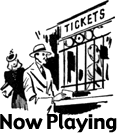
![]()

| This week: |
Filthy says: |
| People tend to believe what they want. Some assholes get giddy just at the possibility of something bad happening to an enemy, and then try to find every reason to believe it's true. But people also want to believe the best for themselves. That's where con artists come in. They take advantage of people so fucking stupid that they'll believe good things just fall into their laps. Psychics work because people want to buy their shit, not because they have any supernatural powers. Get-rich-quick late-night-no-money-down real estate scams succeed because dumbasses want to believe it's that easy. And morons believe shitty movie critics who act drunk just because their poor vocabularies make them sound like "men of the people." The Hoax is about a smooth-talking con artist who exploits people by saying what they want to hear. It is based on the true story of Clifford Irving (Richard Gere), a struggling writer who, faced with mounting debt and a deep need to feel important, claimed to have the exclusive rights to reclusive, nutjob billionaire Howard Hughes' autobiography. Of course, he didn't. He had never even met him. And he had no evidence to suggest he did, except a few forged letters. Publisher McGraw-Hill wanted very badly to believe him, though. They wanted it enough that they shut their ears to all sorts of evidence to the contrary, and didn't bother doing any diligent verification. If we close our ears and wish hard enough, it'll come true. So, like a good con man, Gere takes advantage of people by making them complicit in the scheme. Along the way, Gere, who is also a philanderer, lures his sad-sack best friend (Alfred Molina) into his scheme as his chief researcher, and his wife as a forger who goes to Switzerland to cash the checks that are supposed to be for Hughes. What makes The Hoax pretty damn good is not Richard Gere. Not really. I mean, he's all right, but it's pretty damn hard to buy him as a struggling, New York Jew. No, what makes the movie is the direction by Lasse Hallstr–m, who appears to take the source material by Irving himself, and relate with a hell of a lot of skepticism. In real-life, Irving is a guy who wrote a book about an art forger and then a fake autobiography, so it makes a lot of sense to make him as unreliable a narrator as the harelip at 2:15 a.m. on the day rent is due. In fact, portions of the story are clearly bullshit, and Gere's portrayal of Irving is unsympathetic. Really, he's an asshole who will fuck over anyone and then tell them a lie to get what he wants. What's fascinating is how everyone around him is not much better. They go along with his scheme, because they want to believe, or they want him to like them. As the noose tighten, he squirms and schemes even deeper. It's fun in the same way that it is to watch the Harelip squirm when you point out her lies; that she has never flown in a spaceship, that she didn't pay back the money she borrowed last month, not even in kruggerands left on your doorstep, and that she never had your lovechild. Eventually, it all blows up, and the Harelip yells, "Fuck you," and either spits or vomits on you. It's worth it, though, just to hear the stories and see how far she'll spin it when she's desperately trying to get something. And so is The Hoax. Greed allowed such a crock of shit to get all the way to being published, to having Nixon feel threatened by the fictitious book's contents, and to forcing Howard Hughes out of hiding to declare the book a hoax. Molina, although complicit, is the most sympathetic character. He is emotionally needy and has remorse for the scam because it isn't something he would have done. Gere is a little too oily, I think. This Irving had to have been slick, but Gere makes him so slick that I don't see how so many people would care what he thinks. Hallstr–m's direction keeps it moving. I was amazed at how involved I was in a story that's clearly part bullshit and clearly just about publishing a book. Four Fingers for The Hoax. |
 |
|
The Great Pete Hammond of Maxim Fracture is "A mesmerizing game of cat and mouse. A sleek, surprising and surefure thriller that will grab you by the throat!" Reign Over Me is "One of the most powerful films in years. Exhilarating. A movie you must see." |
 Filthy's Reading Seymour Hersh - Chain of Command Listening to The Fratellis - Costello Music Watching Strangers with Candy  |



